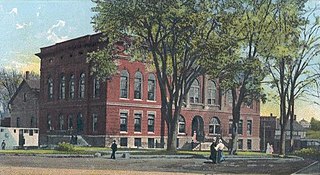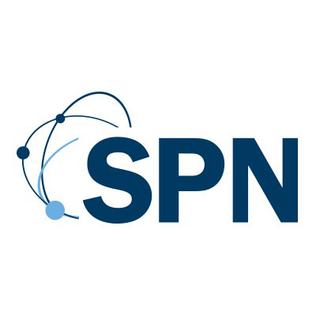
Presque Isle is the commercial center and largest city in Aroostook County, Maine, United States. The population was 8,797 at the 2020 Census. The city is home to the University of Maine at Presque Isle, Northern Maine Community College, Husson University Presque Isle, Northern Maine Fairgrounds, The Aroostook Centre Mall, and the Presque Isle International Airport.

Waterville is a city in Kennebec County, Maine, United States, on the west bank of the Kennebec River. The city is home to Colby College and Thomas College. As of the 2020 census the population was 15,828. Along with Augusta, Waterville is one of the principal cities of the Augusta-Waterville, ME Micropolitan Statistical Area.

The Modern Language Association of America, often referred to as the Modern Language Association (MLA), is widely considered the principal professional association in the United States for scholars of language and literature. The MLA aims to "strengthen the study and teaching of language and literature". The organization includes over 25,000 members in 100 countries, primarily academic scholars, professors, and graduate students who study or teach language and literature, including English, other modern languages, and comparative literature. Although founded in the United States, with offices in New York City, the MLA's membership, concerns, reputation, and influence are international in scope.

Husson University is a private university in Bangor, Maine. It offers undergraduate and graduate degrees and as of Fall 2020 had a total enrollment of 3,476 students, including 799 graduate students in master's and doctoral programs.

George Thatcher was an American lawyer, jurist, and statesman from the Maine district of Massachusetts. His name sometimes appears as George Thacher. He was a delegate for Massachusetts to the Continental Congress in 1787 and 1788. He was an associate justice of the Massachusetts Supreme Judicial Court from 1801 to 1824.
The American Council of Learned Societies (ACLS) is a private, nonprofit federation of 75 scholarly organizations in the humanities and related social sciences founded in 1919. It is best known for its fellowship competitions which provide a range of opportunities for scholars in the humanities and related social sciences at all career stages, from graduate students to distinguished professors to independent scholars, working with a number of disciplines and methodologies in the U.S. and abroad.
The National Council for the Social Studies (NCSS) is a U.S.-based association devoted to supporting social studies education. It is affiliated with various regional or state level social studies associations, including: the Middle States Council for the Social Studies, the Washington State Council for the Social Studies, the New York City UFT Association for the Teaching of Social Studies, the Michigan Council for the Social Studies, Massachusetts Council for the Social Studies, and Virginia Council for the Social Studies. They publish several journals; their flagship publication being a peer-reviewed journal titled Social Education which, according to their website, aims to strike "a balance of theoretical content and practical teaching ideas." They sponsor the high school honor society Rho Kappa.
The National Humanities Center (NHC) is an independent institute for advanced study in the humanities. The NHC operates as a privately incorporated nonprofit and is not part of any university or federal agency. The center was planned under the auspices of the American Academy of Arts and Sciences, which saw a need for substantial support for academic research in the humanities, and began operations in 1978.
Established in 1988, the Consortium of Humanities Centers and Institutes serves as a site for the discussion of issues germane to the fostering of cross-disciplinary activity and as a network for the circulation of information and the sharing of resources within the humanities and interpretive social sciences. CHCI has a membership of over 200 centers and institutes that are remarkably diverse in size and scope and are located in the United States, Australia, Canada, China, Korea, Finland, Taiwan, Ireland, United Kingdom, and other countries.
Virginia Humanities (VH), formerly the Virginia Foundation for the Humanities, is a humanities council whose stated mission is to develop the civic, cultural, and intellectual life of the Commonwealth of Virginia by creating learning opportunities for all Virginians. VH aims to bring the humanities fully into Virginia's public life, assisting individuals and communities in their efforts to understand the past, confront important issues in the present, and shape a promising future.

The Council of State Governments (CSG) is a nonpartisan, non-profit organization in the United States that serves all three branches of state government. Founded in 1933 by Colorado state Sen. Henry W. Toll, CSG is a region-based forum that fosters the exchange of insights and ideas to help state officials shape public policy.
The Maine Arts Commission is a state agency that assists artists and arts organizations in bringing music, dance, poetry, painting and other arts activities into the lives of people in Maine.
The Missouri Humanities Council, "Missouri Humanities" (MH) is a 501(c)(3), non-profit organization that was created in 1971 under authorizing legislation from the U.S. Congress to serve as one of the 56 state and territorial humanities councils that are affiliated with the National Endowment for the Humanities (NEH).

The State Policy Network (SPN) is a nonprofit organization that serves as a network for conservative and libertarian think tanks focusing on state-level policy in the United States. The network serves as a public policy clearinghouse and advises its member think tanks on fundraising, running a nonprofit, and communicating ideas. Founded in 1992, it is headquartered in Arlington, Virginia, with member groups located in all fifty states.
As of 2013, there were around 10,000 ethnic Somalis in Lewiston and Portland.
The Mississippi Humanities Council is a private not-for-profit corporation funded by the United States Congress and the National Endowment for the Humanities. Its mission is "to provide public programs in traditional liberal arts disciplines to serve nonprofit groups in Mississippi." The Mississippi Humanities Council belongs to a group of 55 other such state and territorial humanities councils that receive Federal support. The MHC was founded in 1972.

Ethel "Billie" Wilson Gammon was an American educator and living history museum founder and director. In 1974 she founded the Washburn-Norlands Living History Center on the former estate of Israel Washburn in Livermore, Maine, and served as its volunteer executive director until 1991. Her educational and outreach programs brought 40,000 visitors to the site annually by the end of the twentieth century. She was inducted into the Maine Women's Hall of Fame in 1997.

The Louisiana Endowment for the Humanities is a nonprofit organization dedicated to furthering the education of residents of the state of Louisiana. In its mission, the Louisiana Endowment for the Humanities pledges to provide access to and promote an appreciation of the history of Louisiana and its literary and cultural history. It was founded in 1972 as a result of initial funding by the National Endowment for the Humanities.

Oregon Humanities, formerly known as the Oregon Council for the Humanities, is an independent, nonprofit affiliate of the National Endowment for the Humanities for the U.S. state of Oregon.
Pennsylvania Humanities Council (PHC) is a non-profit affiliate of the National Endowment for the Humanities based in Philadelphia, Pennsylvania. It is one of 56 state humanities councils founded in the wake of the National Foundation on the Arts and Humanities Act of 1965. The Executive Director is Laurie Zierer.









